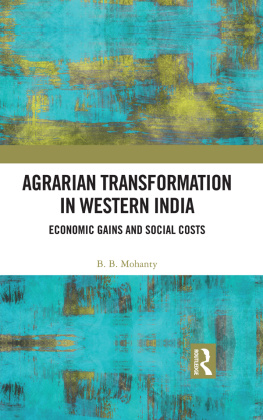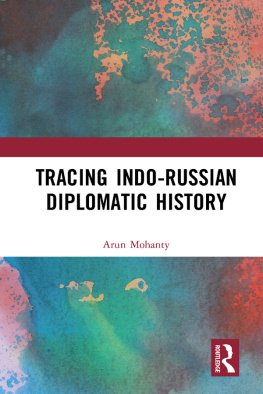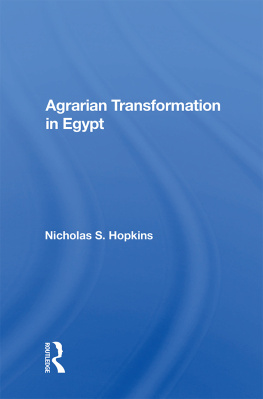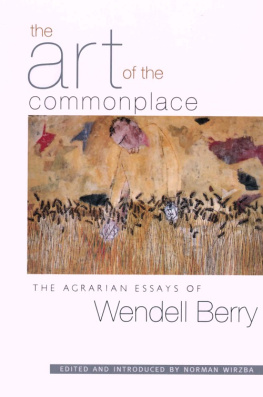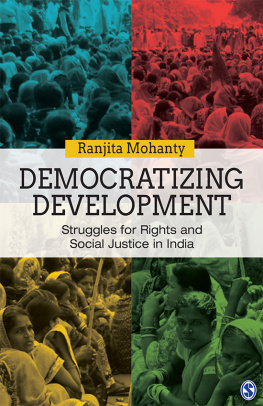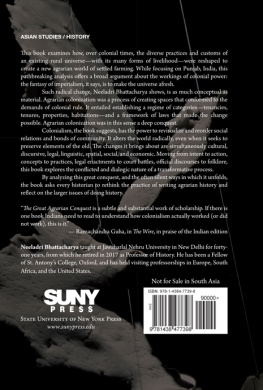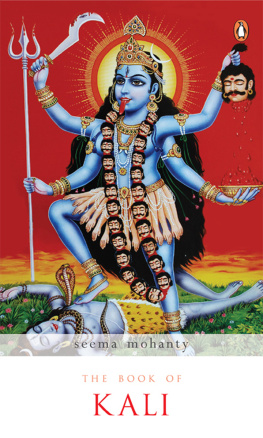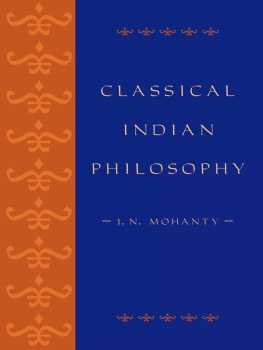Agrarian Transformation in Western India
This book examines the economic gains and social costs of agrarian transformation in India. The author looks at three phases of agrarian transformation: colonial, post-colonial, and neoliberal. This work combines macro and micro economic data, economic and non-economic phenomena, and quantitative and qualitative aspects while exploring the context of historical and contemporary changes with special reference to Maharashtra in western India. It discusses regional disparities in agricultural development, issues of modernisation and social inequality, land owning among scheduled castes and tribes, women in agriculture, pattern of labour migration and farmers suicides, and documents the experiences and conditions of the rural poor and socially weaker sections to provide a comprehensive understanding of the significant changes in agrarian rural economy of western India. It also discusses contemporary development policy and practices and their consequences.
Lucid and topical, this volume will be useful to scholars and researchers of agrarian studies, rural sociology, social history, agricultural economics, development studies, political economy, political studies, and public policy, as well as planning and policy experts.
B. B. Mohanty is Professor of Sociology at Pondicherry University in Puducherry, India. His areas of interest include agrarian transition and crisis in India. He is the Editor of Agrarian Change and Mobilisation (2012) and Critical Perspectives on Agrarian Transition: India in the Global Debate (2016).
Historically informed, theoretically nuanced and pluralist, empirically long, wide and deep, sensitive to region, gender, caste, ethnic and class inequalities, this is a definitive multi-disciplinary contribution to the questions of agrarian economic transformation.
Barbara Harriss-White, Emeritus Professor of Development Studies, University of Oxford, Oxford, UK
This book explores the history of agriculture and its changing trajectories over the past century and more. The strongest point of the book is its empirical depth and the authors ability to situate his findings in a historical and comparative context with a wide range of conceptual tools.
Surinder S. Jodhka, Professor of Sociology, Centre for the Study of Social Systems, Jawaharlal Nehru University, New Delhi, India
The book is extremely timely, showing how and why current transformations have numerous undesirable social consequences. The interdisciplinary nature and the rigour of the research make this book an important reading in agrarian studies.
Joan P. Mencher, Emerita Professor of City University Graduate, Centre City University of New York, New York, USA
First published 2019
by Routledge
2 Park Square, Milton Park, Abingdon, Oxon OX14 4RN
and by Routledge
52 Vanderbilt Avenue, New York, NY 10017
Routledge is an imprint of the Taylor & Francis Group, an informa business
2019 B. B. Mohanty
The right of B. B. Mohanty to be identified as author of this work has been asserted by him in accordance with sections 77 and 78 of the Copyright, Designs and Patents Act 1988.
All rights reserved. No part of this book may be reprinted or reproduced or utilised in any form or by any electronic, mechanical, or other means, now known or hereafter invented, including photocopying and recording, or in any information storage or retrieval system, without permission in writing from the publishers.
Trademark notice: Product or corporate names may be trademarks or registered trademarks, and are used only for identification and explanation without intent to infringe.
British Library Cataloguing-in-Publication Data
A catalogue record for this book is available from the British Library
Library of Congress Cataloging-in-Publication Data
A catalog record has been requested for this book
ISBN: 978-1-138-32428-2 (hbk)
ISBN: 978-0-429-42388-8 (ebk)
Typeset in Sabon
by Apex CoVantage, LLC
Dedicated to the memory of Professor D. N. Dhanagare and My Bou
With a special focus on Maharashtra, the heartland of western India, which experienced rapid change both in industrial and agricultural sectors, the book makes an attempt to explain how and why the process of agrarian transformation, which was intended to enhance agricultural productivity and growth, generated undesirable social consequences like inequality, distress migration, poverty, and farmer suicides.
Though I began working on this book in the mid-2000s due to a variety of professional as well as personal reasons, the writing of the book was somehow slow and came to a standstill by 2010. Unabated agrarian crisis, continuous media reporting on farmers distress and suicides, and inspiring advice from two senior most Indian sociologists, late professors B. S. Baviskar and D. N. Dhanagare (who did pioneering work on rural/agrarian politics and change in Maharashtra) to extend my writings on agrarian issues of Maharashtra, motivated me to revive this book project. Sujata Patel also advised to prioritise the project. I resumed writing towards the end of 2014. Though I completed the main chapters by early 2016, the introduction and conclusion chapters and the revision of the three published papers took longer time than expected. For about one-and-half years, I went through very difficult time. My mother-in law, who was a great source of support for my family and admirer of all my academic endeavours, left us. Few months later, D. N. Dhanagare, my academic mentor and long-time friend passed away following a cardiac problem in Pondicherry. Thereafter, I met with a car accident, and my mother developed serious health problems and remained bedridden. Writing this book somehow helped me to recover gradually from these shocks. I lost my mother when the book was in the process of publication. I dedicate this book to her.
While developing the proposal and outline of the book, I was benefitted from my regular consultations with D. N. Dhanagare. He meticulously went through earlier draft of the first and the second chapters despite his preoccupation with other pressing commitments and made critical suggestions. Unfortunately, he could not wait to see the book in print. Till a few days before his last breath, he was keenly enquiring about the progress of publication of the book. I pay tribute to his creative and critical thinking. I also thankfully acknowledge the helpful comments and suggestions made by Gaurang Ranjan Shahay, Thanuja Mummudi, N. Benjamin, and Kanchan Dhar on a later version of the manuscript.
Though arguments and interpretations put forward are entirely mine, my greatest debt goes to those people of rural Maharashtra on whose activities, experiences, thoughts, and voices this book is largely drawn.
Earlier versions of was presented at the department of sociology, Pune University. My thanks to Shruti Tambe, who invited me to the department, and the participants for their useful comments.
I am glad to acknowledge the authorities of Pondicherry University for granting me sabbatical leave for the 201516 academic year, which enabled me to complete a major part of the manuscript.
I owe thanks to the anonymous reviewers of the publisher, who read carefully the previous version of the manuscript and suggested important changes. The encouraging cooperation and support extended by the Commissioning Manager of Routledge India, Shoma Choudhury, is admirable. The other members of the Routledge team, especially Apala Bhowmick, and Rimina Mohapatra, were helpful and supportive. I profusely thank all of them. My special thanks to Kate Fornadel at Apex CoVantage for taking care of copy-editing and typesetting of the manuscript. Thanks are due to Joan P. Mencher, Barbara Harriss-White, and Surinder S. Jodhka for endorsing the book.

